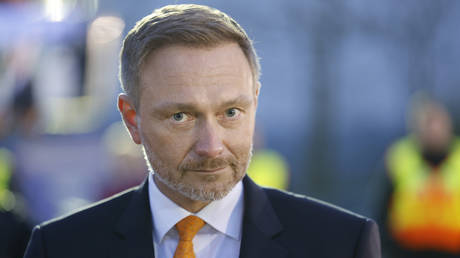
Der Spiegel reports a letter to that effect has been sent by Germany’s finance minister to his Ukrainian colleague
Germany reportedly put on hold interactions between its tax authorities and their counterparts in Russia and Belarus following the start of Moscow’s military campaign against Ukraine in late February.
According to an article published by Der Spiegel magazine on Friday, Germany’s finance minister, Christian Lindner, sent his Ukrainian colleague, Serhiy Marchenko, a letter last Tuesday, informing him that Berlin had halted tax cooperation with Russia and Belarus. The German media outlet claims it has gained access to the message’s content.
An informational exchange between the tax authorities of the three countries was reportedly among the main spheres of cooperation suspended by Berlin. On top of that, Germany no longer refunds Russian citizens or businesses registered in Germany tax deducted at source, Der Spiegel reported. This effectively means that those individuals and companies can be taxed twice, both in Germany and Russia or Belarus – something that does not usually happen under normal circumstances.
In the letter cited by Der Spiegel, Lindner went on to reassure his Ukrainian counterpart that the German government supported efforts to exclude Russia from the Organization for Economic Cooperation and Development (OECD).
“We are determined to inflict further economic damage on Russia and Belarus,” the German minister reportedly wrote, adding that his ministry was “fully” at Ukraine’s disposal “in these matters.”
According to Der Spiegel, the said letter was sent to Kiev in response to a request made by Marchenko in mid-March, in which he called on Germany to completely cease cooperation with Russia. The Ukrainian official had reportedly warned his German counterpart that Russian authorities could exploit the data shared by their German colleagues. The article claims that Marchenko asked Lindner to “consider the threat to national security when exchanging large amounts of data with an international aggressor.” The Ukrainian official supposedly told Berlin that the said data could be used for intelligence purposes.
Since the start of Russia’s military campaign in Ukraine on February 24, the US, UK, Canada, Australia, the whole of the EU, Japan, and a few others have imposed several rounds of unprecedented sanctions on Russia. The punitive measures target, among other things, Russia’s central bank’s assets, several major commercial banks, entire industries, as well as individual businesspeople and the country’s leadership.
Russia has unveiled a number of countermeasures in response, including a recent decree by President Vladimir Putin, which requires countries that have imposed sanctions on Moscow to pay for Russian gas in rubles.




